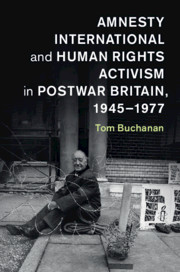Crossref Citations
This Book has been
cited by the following publications. This list is generated based on data provided by Crossref.
O'Sullivan, Kevin
2021.
The NGO Moment.
2021.
BIBLIOGRAPHY.
International Review of Social History,
Vol. 66,
Issue. 3,
p.
521.
Srivastava, Swati
2022.
Navigating NGO–Government Relations in Human Rights: New Archival Evidence from Amnesty International, 1961–1986.
International Studies Quarterly,
Vol. 66,
Issue. 1,
Lowman, Thomas
2023.
Amin reframed: the UK, Uganda, and the human rights ‘breakthrough’ of the 1970s.
Cambridge Review of International Affairs,
Vol. 36,
Issue. 4,
p.
492.
Botta, Felix A. Jiménez
2023.
Popular culture and celebrity activism in the British solidarity campaign with Sandinista Nicaragua, 1979–1990.
Journal of Transatlantic Studies,
Vol. 21,
Issue. 1-2,
p.
30.
Hurst, Mark
2023.
Crossing the curtain: British activists and the echoes of soviet dissent in contemporary Russian human rights activism.
Cambridge Review of International Affairs,
Vol. 36,
Issue. 4,
p.
513.
Hilliard, Christopher
and
Duranti, Marco
2024.
Human Rights at the Edges of Late Imperial Britain: The Tyrer Case and Judicial Corporal Punishment from the Isle of Man to Montserrat, 1972–1990.
Law and History Review,
Vol. 42,
Issue. 2,
p.
343.
2024.
The Contemporary International Committee of the Red Cross.
p.
133.



